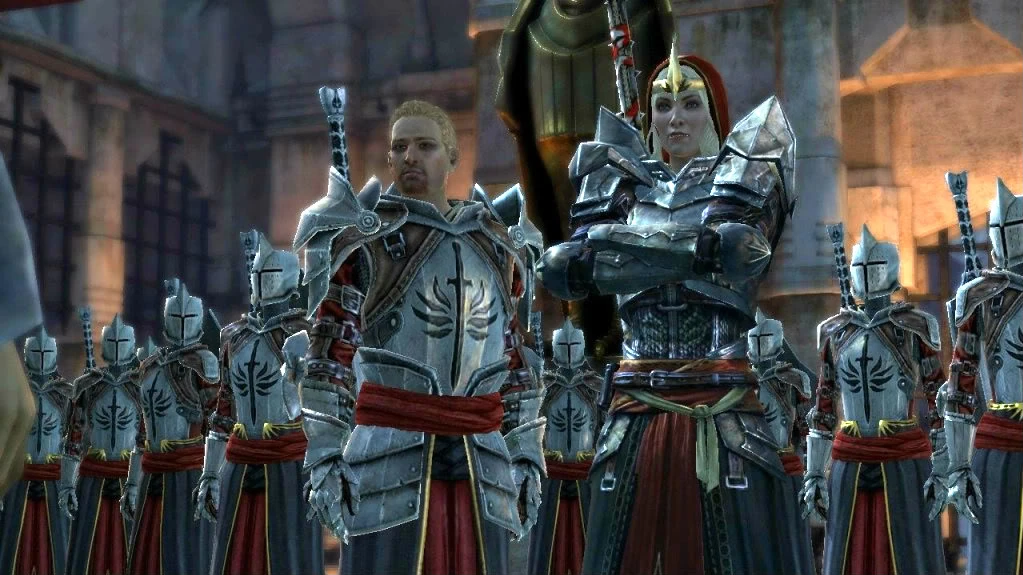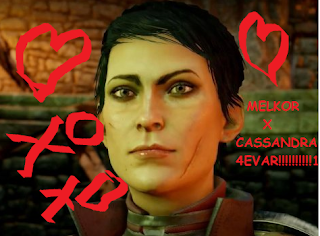Hey there, true believers! Salutations from Ferelden, land of mystical elves and TERRIBLE posture. Not to mention bad hairstyles, weird fashion choices, and stupid facial tattoos.
His chiropractor is the richest man in all of Thedas.
Since I’ve written the first part of Melkor’s saga,
the crisis of male insecurity continues to spiral. In spite of mass shootings lawmakers just passed a bill making it easier to carry bang-bang shooties, an Indiana police officer was suspended for daring to suggest that guys have an easier time in the world than gals, and oh yeah, agricultural workers in the U.S. are taking their own lives in record numbers, possibly because they find it more socially acceptable than asking for help. Guys continue to be in crisis due to a ritualistic, endemic reinforcement of their insecurity, and they continue to endanger others due to this problem. Just... You know. A little reminder of where we're at, right now.
But, back to the elves!! Melkor has been busy in Ferelden. He's killed his first dragon, gotten absolutely nowhere in romancing his crush, and has acquired a slightly more intimidating outfit than "whatever the Inquisition had in the lost and found."
Bringing the man-romper back, one Elf at a time.
Let's recap. When last we left our whiny, emo protagonist, he'd been put in charge of the Inquisition--an ancient order designed to root out corruption and evil. Apparently, last time they started up one of these, it resulted in lots of dictatorship and torture. So, obviously the logical thing to do is start the whole thing up again and put an elven teenager in charge. Good plan, Ferelden. You really nailed that one.
Melkor's journey has gotten a little darker. Soon after allying with the Templars, his army's camp was attacked by a horde of evil wizards. These guys (apparently) are something called the Venatori, and they're led by an illustration from a 13-year-old boy's sketchbook of SUPER DARK AND EDGY ORIGINAL CHARACTERS.
"CRAWLING IN MY SKIIIN! THESE RED LYRIUM WOUNDS, THEY WILL NOT HEAL!"
For obvious reasons, this pissed off Melkor. Not only does the bad guy, Corypheus, have an army and a Darkspawn dragon (so cool!) he's also competing with Melkor for the #1 "Most Grimdark Character In Dragon Age" title. Melkor can't have that. He is the most edgy edge-lord here, not this Two-Face wannabe. So, he tries to duel the big evil guy... and gets his shit slapped.
"I'm gonna read him ALL my dark poetry. That'll show the POSER."
I took a video of this hilarious encounter, but my PS4 deleted it. Boo, hiss. Suffice to say, Melkor did not do well. The mystery mark on his hand made him vulnerable to Corypheus' magic, and also, he broke the first rule of playing mages in video games: Never, ever try to tank the boss. As a mage, you are squishy, and squishy does not do tanking. Squishy hangs in the back, and tries not to die.
Apparently Melkor hasn't played WOW, though, so he got throttled and then tossed down a mineshaft while his trebuchets went all Mulan on the bad guy's ass.
It wasn't QUITE as epic as this scene, but really, that's setting the bar kind of high for Bioware.
Cue Melkor struggling through the snow, to collapse at his own army's tattered refugee camp. Damn, this got dark fast. It's almost like his horrible decisions have consequences, or something!
A short break for some armchair psychology. Privilege and insecurity thrive in the absence of challenge: when you're accustomed to walking all over people, the slightest resistance can make you feel like the world is ending. It's not, of course: you're just waking up from a dream of delusion where you thought your needs were more important, or somehow better, than everybody else's. But the reaction to this resistance can have serious consequences. Melkor isn't an asshole, but he is an arrogant Elf who's spent his entire life learning magic and simmering with rage towards humans and Dwarves. His personality is a primed explosive, waiting to go off.
Which is why I was pleasantly surprised to find Dragon Age: Inquisition slowly defusing that bomb. As we covered previously, democracy is hard--it requires compromise. Compromise, at least in theory, removes privilege as both parties try to find equal ground. But sometimes it takes more than a board meeting to help one young Elf realize he's mortal. Sometimes it takes a wake-up call, like Corypheus bitch-slapping him off the side of a mountain, for instance.
Suddenly, Melkor's on the same level as everybody else. Soldiers, generals, Inquisitor: we're all just miserable popsicles in the wake of the Venatori attack. After a sad discussion on religion and a really weirdly placed sing-along that is totally not a ripoff of Pippin's song from Return of the King, we can finally move on to my favorite part: the long-delayed, vitally important, MELKOR REDEMPTION ARC! Hooray!!
But first, we need a place for all these Inquisition soldiers. Somewhere sturdy. Somewhere like... a big, convenient castle that nobody has mentioned until now, and which has been conveniently abandoned for centuries in a strategically placed mountain pass.
... Wait, what?
Are you telling me this castle has belonged to the Inquisition this whole time? If so, why the hell weren't we using it to begin with? Was Hugo Weaving shooting a movie there, or something? Is that why we've waited this entire game to use our super-convenient, badass giant fortress?
Whatever, Bioware. Fine. We'll do this your way.
So we move into the new castle. Melkor gets elected Inquisitor, and makes a speech about how elves are awesome and everybody else sucks. And so begins the feedback loop of gameplay in Inquisition. See, Bioware games are famous for two things: salacious romance between fantasy and sci-fi races, and micromanagement. Micromanagement is meticulous, obsessive tinkering with squad abilities, gear, and game-world diplomacy, and it flopped real hard in Mass Effect 3 and Andromeda.
Someday, Ryder. Someday they'll make a game for your franchise that doesn't suck ass.
This stuff is tedious, time-consuming, and absorbs huge amounts of effort. Running a squad in Dragon Age is like being the leader of medieval Seal Team 6, if that leader had to spend endless hours crunching numbers and ensuring his team can chain exactly the right spells in exactly the right order. For hours.
And I fucking love it.
Don't get me wrong, I'm not a math guy. My dad's dyslexic, and I'm pretty sure long division is actually the Devil. And yet, I cannot resist the gameplay loop of Inquisition. You go out, you grind, your party gets its ass kicked. You limp home exhausted, and pull overtime at the forge to make sure Iron Bull doesn't fucking die from fire next time! Because god dammit, you have worked too hard on this squad for characters to die in combat! Too! Fucking! Hard!
It's a hefty dose of investment bias, compounded by your emotional investment in the story. It's a devious, cruel way to bring players back over and over and God help me, it's my favorite part of the game.
"Well, THAT quest is over. Time to go home and do MATH! Woo!"
Surprisingly, these endless hours of tinkering and perfectionism have had an influence on Melkor's character, too. He started the game as a cold, almost Spock-like loner who refused to care about any of his new "friends," even when those friends saved his life. They're humans, after all--why should he care about them? But for the Inquisition to survive, the Inquisitor has to invest in it. He has to do homework. He has to hump ass across thousands of miles of unstable, war-torn fantasy-land doing obnoxious quests and earning the approval of his party. In short, he has to consider the needs of others before his own. A lot.
Now, I could just throw that stuff to the wind and start chopping off heads. The game's judgment mechanic makes that possible: you get your own Iron Throne Inquisitor's Chair, and from there you can levy judgment on the heads of the FOOLISH UNDERLINGS below you. It's very despotic, and really, seems like it could benefit from a jury or something.
"This next prisoner says Mass Effect Andromeda is a good ga--" "HANG HIM. HANG HIM NOW."
Even though this seems right up Melkor's alley, I can't see him jumping right to it. Because he's also a people-pleaser, just like a lot of compulsive narcissists and liars out there, and he can't help but chase after his group's affections. At his core, he's still an insecure teenager. And while insecurity can result in horrific violence, it also exists for a reason: to push us towards the acquisition of social status. Without fear of losing social status, many great leaders would've never entered the world stage. By the same token, we'd be spared a lot of bad ones as well. It's a double-edged sword.
So even though his childish nature makes him want to go all Red Queen on these fools, he still feels a need to please them. To be their leader, and go where no Elf has gone before. Remember, he's carrying the hopes of an entire people on his shoulders. Not even a rampant egoist is immune to that kind of inherited pressure.
"Must... prove... masculinity... to... my weird Irish elf community!"
And so, Melkor falls into the trap of... Kinda being a good person, sort of? It's like forcing a sullen preteen to do community service. He may bitch and pretend it's the worst thing that's ever happened to him. But in truth, he's making a difference in his community, and meeting people whose views run contrary to his own--which is like Kryptonite to privilege and xenophobia. Sooner or later, this experience will change him. He'll finally grow as a person.
Well... In most ways. In a lot of ways, he'll still be an asshole.
"It's called a Dracolisk, DAD! It's BETTER than a horse! You wouldn't understand!!"
Tune in next post, when Melkor goes to a fancy dinner party... And commissions a dwarf to write porn for his crush. No, really, this is a thing you can do in Dragon Age. I told you the micromanaging went deep, didn't I? So deep.
Maybe too deep. I've been playing this game in my dreams. Please send help.
See you next time!

















